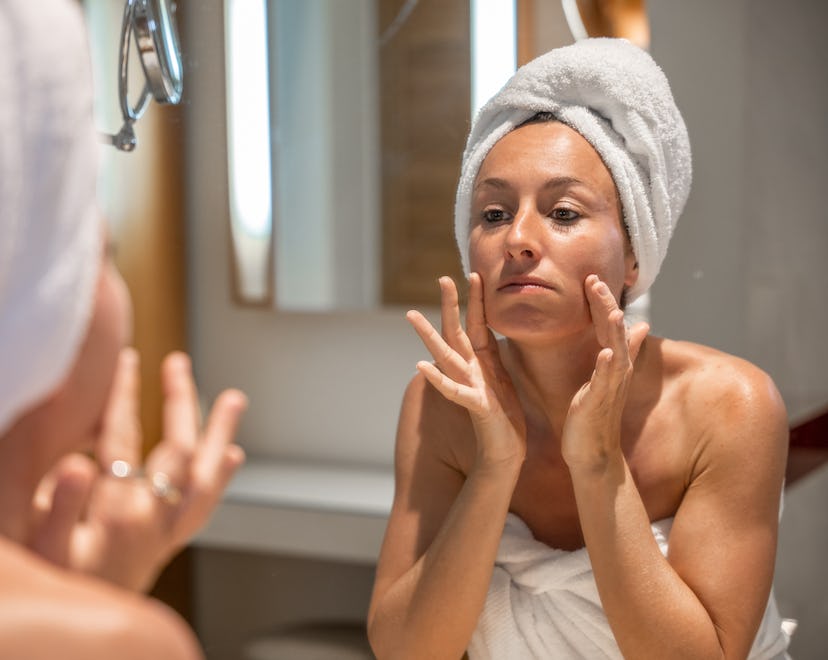Postpartum

Postpartum Acne Happens, But You Can Deal With It
Understand the hormones at work, then treat your skin gently while it rebalances.
Recovery from childbirth is… well, you can fill in the blank, but the word you’re thinking of probably isn’t “easy.” Add brand new breakouts to the emotional, exhaustive mix and you’ve upped your frustration level yet again. “Acne flare-ups are not uncommon during pregnancy and postpartum,” says Dr. Dendy Engelman, M.D., board-certified NYC-based cosmetic dermatologist. And while knowing that postpartum acne can be common makes the condition a bit more bearable, shopping for the right topical products and treatments can help even more. But before you go attacking your pimples with toothpaste or super-harsh chemical peels, it’s important to consider what could be causing the acne, if breastfeeding may have an impact, and what ingredients and techniques can bring back a healthy glow.
Why Am I Getting Postpartum Acne?
While there’s likely no one cause that triggers acne for every single postpartum person, Engelman says that “the increase in acne mainly occurs due to hormonal changes in the body.” During this time, “there is an increased activity of sebaceous glands elicited by androgen, which causes proliferation of postpartum acne,” says Jessica Shepherd, M.D., board-certified OB-GYN, and chief medical officer at Verywell Health. While hormones are largely at work, remember that they can be triggered: “New mothers who are under a lot of stress postpartum may also experience breakouts due to the influx of the stress hormone cortisol in the body,” Engelman tells Romper.
Postpartum acne isn’t confined to your face, either. Shepherd explains that, as glands are all over your body, “enlargement of sebaceous glands and an increase in sebum can create clogging in the follicles. This creates an optimal environment for pathogenic bacteria, or ‘acne bacteria’ — Propionibacterium acnes.”
Does Breastfeeding Cause Postpartum Acne?
Breastfeeding and weaning may prompt new acne due to more hormonal fluctuations. “Breastfeeding can also cause your acne to stick around for a longer period of time because new mothers’ hormone levels do not return back to normal until after breastfeeding,” says Engelman. Some good news is that you can treat breakouts while breastfeeding and riding these hormonal ups and downs. But while the urge to fill your virtual cart with new, max-strength zit creams and sloughing acids is totally understandable, it might cause more harm than good.
How Can I Treat Postpartum Acne?
Washing with a synthetic detergent cleanser, like Cetaphil, may be beneficial, as it can minimize skin irritation and dryness by way of having a pH much closer to that of skin than soap, Shepherd tells Romper. “Be careful to cleanse skin gently and avoid aggressive scrubbing,” Shepherd says. When it comes to spot-treating pimples, easy does it. Engelman recommends postpartum people try sticking to their usual skincare routines as much as possible, “rather than aggressively treating any unusual acne outbreaks with targeted ingredients like salicylic acid.” If your acne is stemming from an uptick in hormones, “drying out skin with acne-fighting ingredients and abrasive exfoliants are unlikely to help, as they will not address the root cause of the acne,” says Engelman, who shares that a healthy diet and lower stress levels may help.
Can I Safely Treat Postpartum Acne While Breastfeeding?
If breastfeeding, keep a sharper eye on your potential topical treatments. “Many of the most effective prescription treatments for stubborn acne are contraindicated during pregnancy and lactation,” says Shepherd. You may want to still skip, say, retinoids as a solve right now.
“It is important to consult with your doctor to determine which medications and products are safe to use while breastfeeding,” says Engelman, who shares glycolic acid as a potential solution to help treat postpartum breakouts while breastfeeding. The ingredient, found in many products from cleansers to serums, can help unclog and smooth the surface.
So how long should you put up with postpartum breakouts? “If the acne doesn't resolve in three to six months, women should consider seeing a dermatologist. Hormones can change in the postpartum phase, contributing to different levels that can affect skin,” Shepherd says.
Experts:
Dr. Dendy Engelman, M.D., FACMS, FAAD, board certified cosmetic dermatologist, Moh’s surgeon, Shafer Clinic, NYC
Jessica Shepherd, M.D., board-certified OB-GYN, and chief medical officer at Verywell Health
This article was originally published on